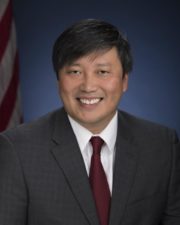Korean Immigrant Joins City Council to Fight for North-Atlanta Businesses
Date: October 17, 2017
When John Park, a resident of Brookhaven, Georgia, saw that his neighbors’ interests were being overlooked by local officials, he decided to take action. “The city government was skewed too much toward business interests and not the people who live here,” says Park, who works full time as a disease surveillance specialist for the Association of Public Health Laboratories. “And rather than sit around and complain, I decided to do something about it.” In 2014, Park ran for city council and won.

Park, who was born in Korea, calls himself “a limited government kind of guy,” but he believes in flexibility as much as efficiency. “Rather than understand, politicians just choose to label,” he says. But “sometimes the pure libertarian free market doesn’t work and sometimes the more progressive control doesn’t work. My political philosophy is: Let’s fix the problems we have.”
Park credits his immigrant background for this humble, pragmatic attitude. His family moved to the United States in 1980 in the wake of a military coup. Park was 6 at the time, and from a young age he knew not to take anything for granted. “My mother said, ‘You’ll have to work twice as hard as American citizens,’ he says. “Nothing will be handed to me.” He also understood that he needed to adapt — and that meant having an open mind. “A lot of people live in comfort zones their whole lives,” he says. “They’re not challenged with different cultures and people who think differently.”
I think it’s our constant refresh rate, constant renewal, that makes America what it is.
Park has been challenged in this way, and he’s able to champion Brookhaven’s diverse community. “There are great ethnic restaurants, a lot of people walking, out and about,” he says. “We felt like the city council was trying to enforce suburban values on urban areas — making it homogenous, developing it in a way that takes away the character of area.”
What Park calls character isn’t just window dressing; it translates into crucial economic benefits. In his congressional district, which includes many of the northern suburbs of Atlanta, there are over 7,000 businesses owned by immigrants, who are 40.7 percent more likely to be entrepreneurs there than are the U.S.-born. In the United States as a whole, 5.9 million people were employed at private, immigrant-owned firms in 2007, the most recent year for which figures are available. “So much of what we have in America was started by immigrants,” Park says. “I think it’s our constant refresh rate, constant renewal, that makes America what it is.”
Immigrants embrace America “not just as a physical place but as an idea,” he says. “They understand the gift they have been given,” which makes them appreciate the democratic system and strive to give back to their new country. Park’s family applied for permanent residency when he was in high school, and he remembers feeling afraid that he’d be sent back to Korea. During the interview, he recalls, “the official asked us, ‘You kids, what are you up to?’ Both of my brothers said they were in college and I was applying. And at the end of the interview, the immigration officer said, ‘I guess you guys are pretty settled in.’ ” Park still remembers that exact phrase: Of course they were settled in. The family was, for all intents and purposes, American.
Park would like to see immigration reform that finds a permanent solution for Dreamers, young people who were brought to the country illegally as small children and who qualify for Deferred Action for Childhood Arrivals (DACA). The policy currently provides recipients with only temporary relief from deportation, and its future is uncertain. His own city of Brookhaven, which is thriving, with projected job growth of 42 percent over the next 10 years, is instructive of the type of community that’s possible when leaders acknowledge the contributions that immigrants make. “In this small city, we’re right next to each other at every public meeting and social event,” he says. “I love the fact that we engage in that way.”
